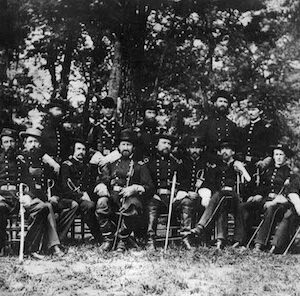Tag: Garfield (James A.)
 Wikipedia says: James Abram Garfield (November 19, 1831 – September 19, 1881) was the 20th President of the United States, serving from March 4, 1881, until his assassination later that year. Garfield had served nine terms in the House of Representatives, and had been elected to the Senate before his candidacy for the White House, though he declined the Senate seat once he was elected president. He is the only sitting House member to be elected president.
Wikipedia says: James Abram Garfield (November 19, 1831 – September 19, 1881) was the 20th President of the United States, serving from March 4, 1881, until his assassination later that year. Garfield had served nine terms in the House of Representatives, and had been elected to the Senate before his candidacy for the White House, though he declined the Senate seat once he was elected president. He is the only sitting House member to be elected president.
Garfield was raised by his widowed mother in humble circumstances on an Ohio farm. He worked at various jobs, including on a canal boat, in his youth. Beginning at age 17, he attended several Ohio schools, then studied at Williams College in Williamstown, Massachusetts, graduating in 1856. A year later, Garfield entered politics as a Republican. He married Lucretia Rudolph in 1858, and served as a member of the Ohio State Senate (1859–1861). Garfield opposed Confederate secession, served as a major general in the Union Army during the American Civil War, and fought in the battles of Middle Creek, Shiloh, and Chickamauga. He was first elected to Congress in 1862 to represent Ohio’s 19th District. Throughout Garfield’s extended congressional service after the Civil War, he firmly supported the gold standard and gained a reputation as a skilled orator. Garfield initially agreed with Radical Republican views regarding Reconstruction, but later favored a moderate approach for civil rights enforcement for freedmen.
At the 1880 Republican National Convention, Senator-elect Garfield attended as campaign manager for Secretary of the Treasury John Sherman, and gave the presidential nomination speech for him. When neither Sherman nor his rivals – Ulysses S. Grant and James G. Blaine – could get enough votes to secure the nomination, delegates chose Garfield as a compromise on the 36th ballot. In the 1880 presidential election, Garfield conducted a low-key front porch campaign, and narrowly defeated Democrat Winfield Scott Hancock.
Garfield’s accomplishments as president included a resurgence of presidential authority against senatorial courtesy in executive appointments, energizing American naval power, and purging corruption in the Post Office, all during his extremely short time in office. Garfield made notable diplomatic and judicial appointments, including a U.S. Supreme Court justice. He enhanced the powers of the presidency when he defied the powerful New York senator Roscoe Conkling by appointing William H. Robertson to the lucrative post of Collector of the Port of New York, starting a fracas that ended with Robertson’s confirmation and Conkling’s resignation from the Senate. Garfield advocated agricultural technology, an educated electorate, and civil rights for African Americans. He also proposed substantial civil service reform, eventually passed by Congress in 1883 and signed into law by his successor, Chester A. Arthur, as the Pendleton Civil Service Reform Act.
On July 2, 1881, he was shot at the Baltimore and Potomac Railroad Station in Washington D.C. by Charles J. Guiteau, a lawyer and writer with a grievance. The wound was not immediately fatal for Garfield, but his doctors’ uncleaned and unprotected hands are said to have led to infection that caused his death on September 19. Guiteau was convicted of the murder and was executed in June 1882; he tried to name his crime as simple assault by blaming the doctors for Garfield’s death. With his term cut short by his death after only 200 days, and much of it spent in ill health trying to recover from the attack, Garfield is little-remembered other than for his assassination. Historians often forgo listing him in rankings of U.S. presidents due to the short length of his presidency.
Showing the single result
